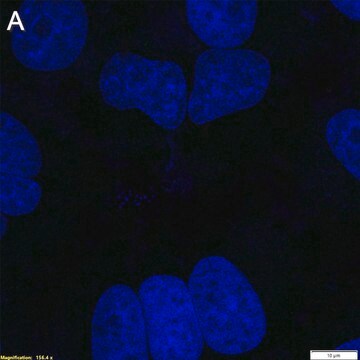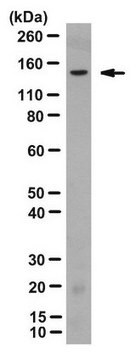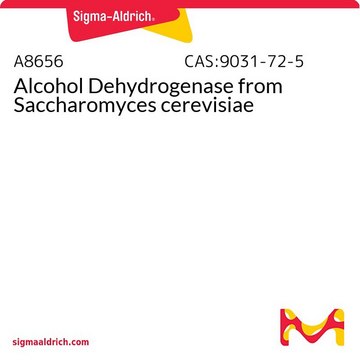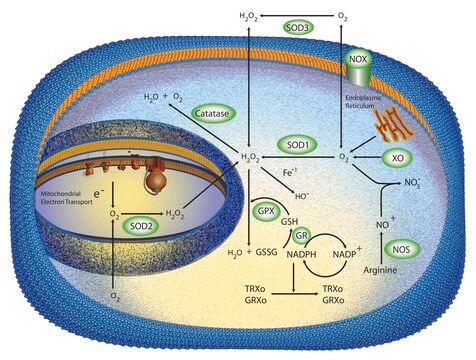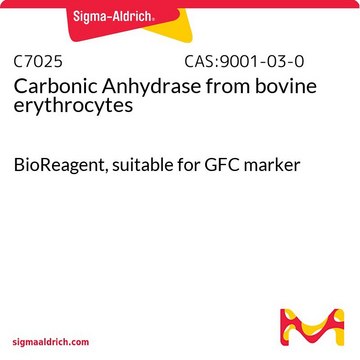All Photos(4)
About This Item
UNSPSC Code:
12352203
eCl@ss:
32160702
NACRES:
NA.41
clone:
polyclonal
application:
WB
technique(s):
western blot: suitable
citations:
45
Recommended Products
biological source
rabbit
antibody form
serum
antibody product type
primary antibodies
clone
polyclonal
species reactivity (predicted by homology)
all
technique(s)
western blot: suitable
shipped in
wet ice
target post-translational modification
unmodified
General description
2A peptides and 2A-like peptide sequences (also known as CHYSEL, or cis-acting hydrolase elements) are a superior alternative to internal ribosomal entry sites (IRES) for coordinating the expression of multiple gene products from a single recombinant construct. 2A peptides allow multiple proteins to be encoded as polyproteins, which then dissociate into component proteins upon translation. The 2A sequence impairs normal peptide bond formation via a mechanism called ribosomal skipping, resulting in effective, non-enzymatic generation of distinct peptide products from a single multicistronic construct. The use of 2A sequences allows the stoichiometric production of up to four proteins from a single vector, making it a powerful tool for the equimolar expression of multiple cistrons.
Specificity
Recognizes the 2A sequence, derived from Foot and Mouth picornavirus (VKQTLNFDLLKLAGDVESNPG*P), where * represents the 2A cleavage site. The epitope is believed to be within the “GDVESNPG” region since the antibody also recognizes the unrelated 2A regions from Thosea asigna virus and Equine rhinitis A virus.
Immunogen
Epitope: The epitope is believed to be within the “GDVESNPG” region.
The immunogen used was recombinant 2A from foot and mouth virus1.
Application
Anti-2A Peptide Antibody is an antibody against 2A Peptide for use in WB.
Research Category
Epitope Tags & General Use
Epitope Tags & General Use
Research Sub Category
Epitope Tags
Epitope Tags
Quality
Western Blot Analysis:
A multicistronic vector was synthesized consisting of several CD3 proteins linked with 2A peptide sequences from foot and mouth disease, Thosea asigna, and Equine rhinitis A viruses, respectively (CD3δ-F2A-CD3ε-T2A-CD3γ-E2A-CD3ζ)1. The vector was transduced in 293 cells. A 1:1000 dilution of this antibody detected the 2A sequence in all three CD3-2A proteins (CD3 epsilon, gamma, delta) generated from a single 2A peptide-linked retroviral vector.
A multicistronic vector was synthesized consisting of several CD3 proteins linked with 2A peptide sequences from foot and mouth disease, Thosea asigna, and Equine rhinitis A viruses, respectively (CD3δ-F2A-CD3ε-T2A-CD3γ-E2A-CD3ζ)1. The vector was transduced in 293 cells. A 1:1000 dilution of this antibody detected the 2A sequence in all three CD3-2A proteins (CD3 epsilon, gamma, delta) generated from a single 2A peptide-linked retroviral vector.
Target description
varies
Linkage
Replaces: 09-085
Physical form
Serum with 0.05% NaN3.
Storage and Stability
Stable for 1 year at -20°C from date of receipt.
Handling Recommendations: Upon receipt, and prior to removing the cap, centrifuge the vial and gently mix the solution. Aliquot into microcentrifuge tubes and store at -20°C. Avoid repeated freeze/thaw cycles, which may damage IgG and affect product performance.
Handling Recommendations: Upon receipt, and prior to removing the cap, centrifuge the vial and gently mix the solution. Aliquot into microcentrifuge tubes and store at -20°C. Avoid repeated freeze/thaw cycles, which may damage IgG and affect product performance.
Analysis Note
Control
2A-containing recombinant proteins
2A-containing recombinant proteins
Disclaimer
Unless otherwise stated in our catalog or other company documentation accompanying the product(s), our products are intended for research use only and are not to be used for any other purpose, which includes but is not limited to, unauthorized commercial uses, in vitro diagnostic uses, ex vivo or in vivo therapeutic uses or any type of consumption or application to humans or animals.
Not finding the right product?
Try our Product Selector Tool.
Storage Class Code
10 - Combustible liquids
WGK
WGK 1
Certificates of Analysis (COA)
Search for Certificates of Analysis (COA) by entering the products Lot/Batch Number. Lot and Batch Numbers can be found on a product’s label following the words ‘Lot’ or ‘Batch’.
Already Own This Product?
Find documentation for the products that you have recently purchased in the Document Library.
Processing of the VP1/2A junction is not necessary for production of foot-and-mouth disease virus empty capsids and infectious viruses: characterization of "self-tagged" particles.
Gullberg, M; Polacek, C; B?tner, A; Belsham, GJ
Journal of virology null
Xiang Jiao et al.
RSC advances, 8(61), 34967-34972 (2018-10-12)
The yeast Saccharomyces cerevisiae serves as a promising host for the production of a wide range of chemical compounds and fuels. Currently, simultaneous expression of several genes could be achieved via the use of 2A viral peptides, yet detailed characterizations
Thea Kristensen et al.
PLoS pathogens, 15(1), e1007509-e1007509 (2019-01-19)
Many picornaviruses cause important diseases in humans and other animals including poliovirus, rhinoviruses (causing the common cold) and foot-and-mouth disease virus (FMDV). These small, non-enveloped viruses comprise a positive-stranded RNA genome (ca. 7-9 kb) enclosed within a protein shell composed
Lasse Neukirch et al.
Oncotarget, 10(14), 1458-1472 (2019-03-13)
Endogenous retroviruses (ERVs) that make up 8% of the human genome have been associated with the development and progression of cancer. The murine model system of the melanoma associated retrovirus (MelARV), which is expressed in different murine cancer cell lines
Alexandra Merkx-Jacques et al.
Biotechnology for biofuels, 11, 248-248 (2018-09-22)
Thraustochytrids are heterotrophic, oleaginous, marine protists with a significant potential for biofuel production. High-value co-products can off-set production costs; however, the cost of raw materials, and in particular carbon, is a major challenge to developing an economical viable production process. The
Our team of scientists has experience in all areas of research including Life Science, Material Science, Chemical Synthesis, Chromatography, Analytical and many others.
Contact Technical Service